Dutch Oven Beef Stew
This post may contain affiliate links. See my disclosure policy.
My low-effort, flavor-packed Dutch oven beef stew is a family-favorite dinner. The tender beef and vegetables almost melt in your mouth!
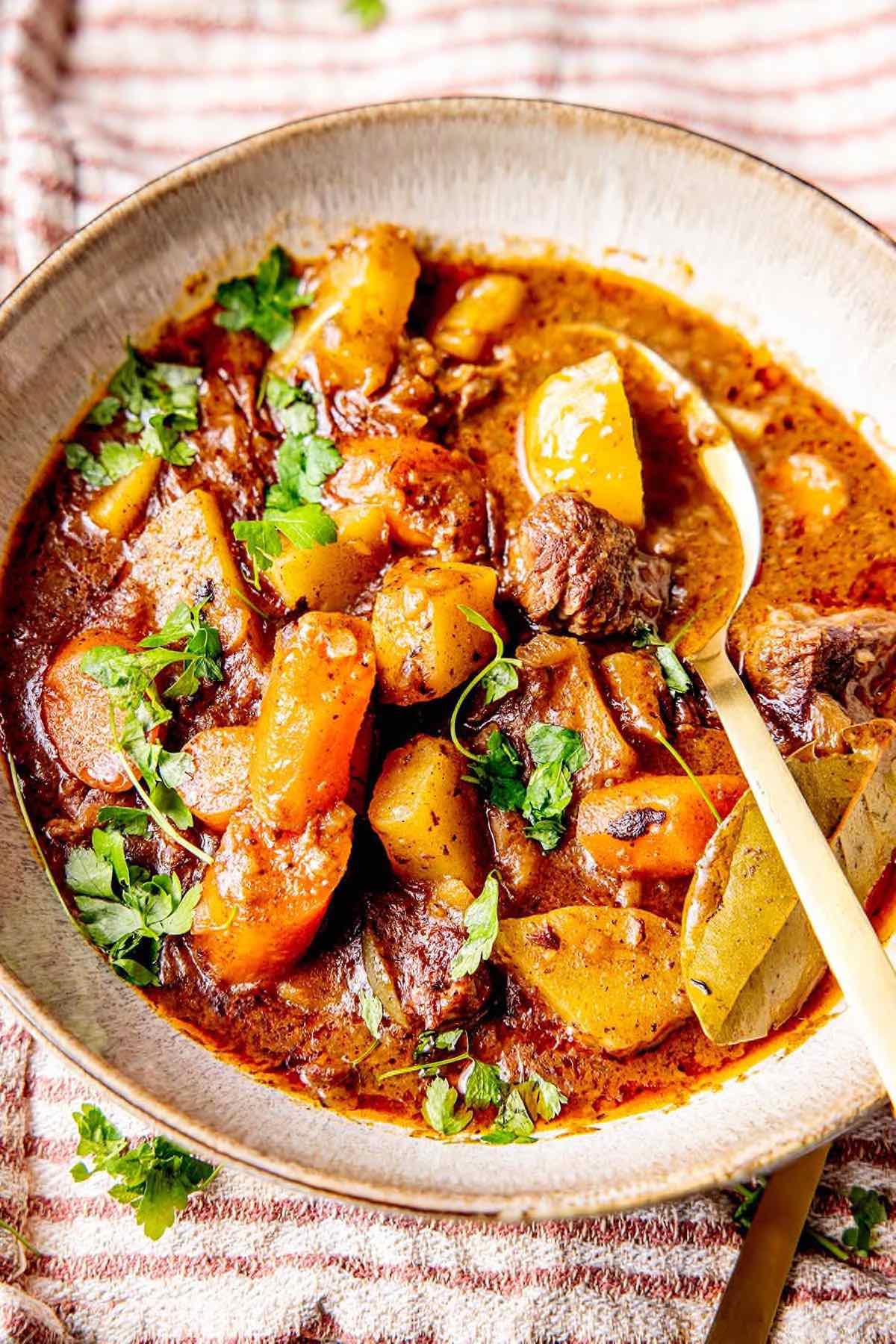
When the weather starts to cool (or if my partner had his way in the peak of Summer), this Dutch oven beef stew becomes a weekly ritual in our house. It’s the kind of cozy, one-pot meal that feels like a Sunday dinner but fits perfectly into a weeknight routine. I first started making it after being gifted a Dutch oven one Christmas. I took my usual stovetop beef stew and tweaked it so it could slowly simmer in the oven.
The beef is seared until caramelized, then slow-cooked with vegetables in a rich, savory sauce that thickens into an almost gravy-like finish. The meat practically melts in your mouth, so I recommend serving it over mashed potatoes, egg noodles, to keep every spoonful tender and warming. You can see why my partner craves it year-round.
Table of Contents
Recipe highlights
- Multiple cooking methods. I love using my Dutch oven, but I’ve also tested this recipe using both an Instant Pot and a slow cooker.
- Inexpensive. The preferred cut for stew is beef chuck, which is generally relatively cheap since it takes longer to cook to become juicy and tender.
Key Ingredients
Here are the main ingredients for my Dutch oven beef stew. The complete list with measurements is in the recipe card.
- Beef chuck. Also known as beef stew meat or boneless chuck roast, it’s my preferred cut for slow cooking. Cut the beef into bite-sized cubes.
- All-purpose flour. To coat the beef and help it brown better. Tossing the meat in flour also traps in all the juices.
- Butter. I used unsalted butter since we’re already adding salt to this stew, though olive oil could also be used.
- Tomato paste. Concentrated tomato flavor that’ll add richness to the sauce.
- Red wine. A secret ingredient to add depth of flavor. Use a dry red wine, such as Cabernet or Pinot Noir. To omit the alcohol, use extra beef broth.
- Balsamic vinegar. To tenderize the beef and to add acidity. White vinegar or apple cider vinegar will work just as well.
- Worcestershire sauce. I’m pretty sure I’ll add this sauce to any recipe that calls for beef. It’s almost non-negotiable.
- Beef broth. I suggest using low-sodium broth if possible.
- Spices. I’m keeping it simple with paprika, bay leaves, salt, and pepper.
- Carrots and potatoes. Stewing vegetables to add flavor and make for a more complete meal.
How to make Dutch oven beef stew
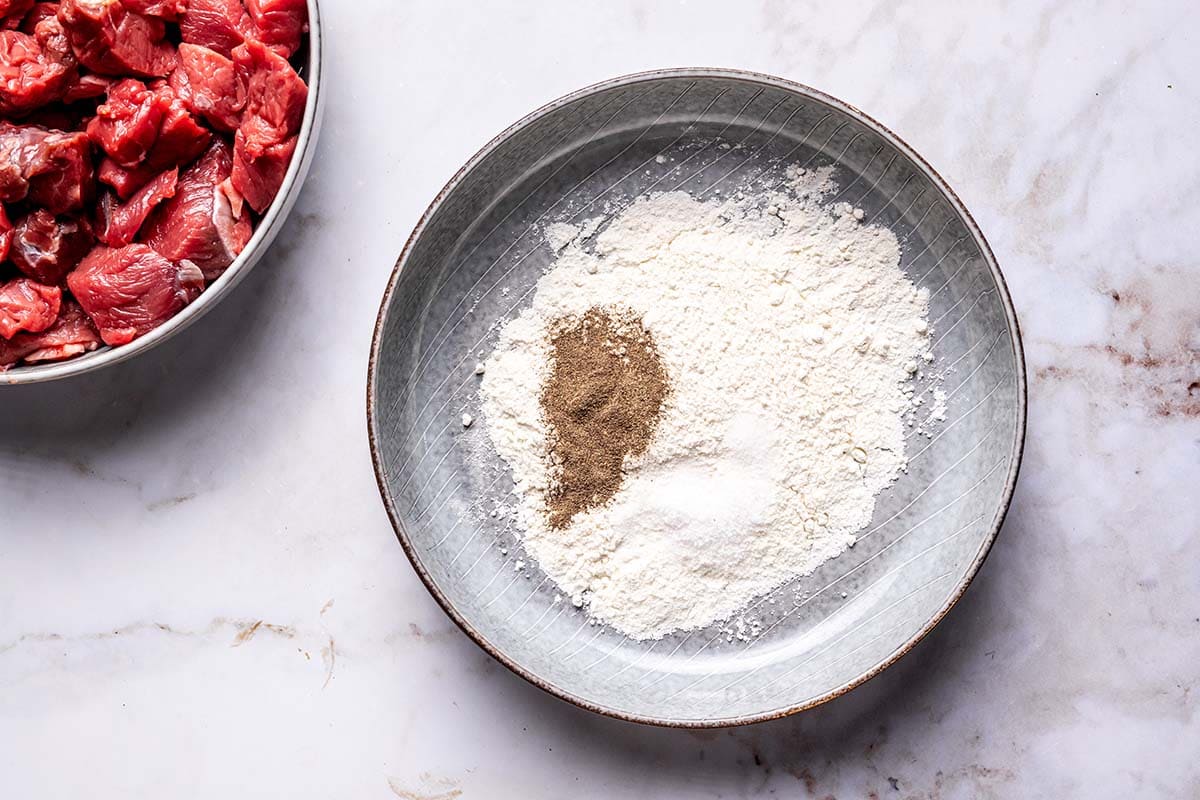
Prep work. In a wide bowl, combine the salt, pepper, and flour.
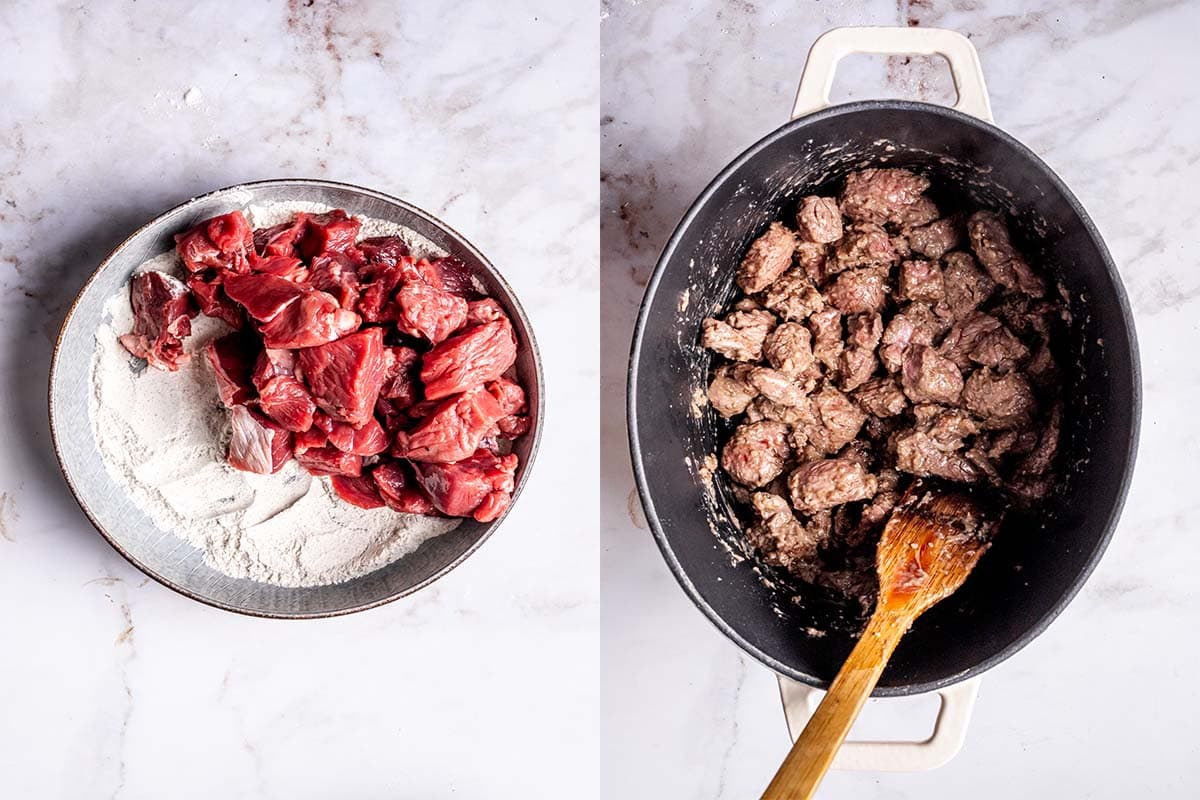
Brown the beef. Dredge the meat in the flour mixture. Heat butter in the Dutch oven and sear the beef until browned on all sides. Remove the meat and set it aside.
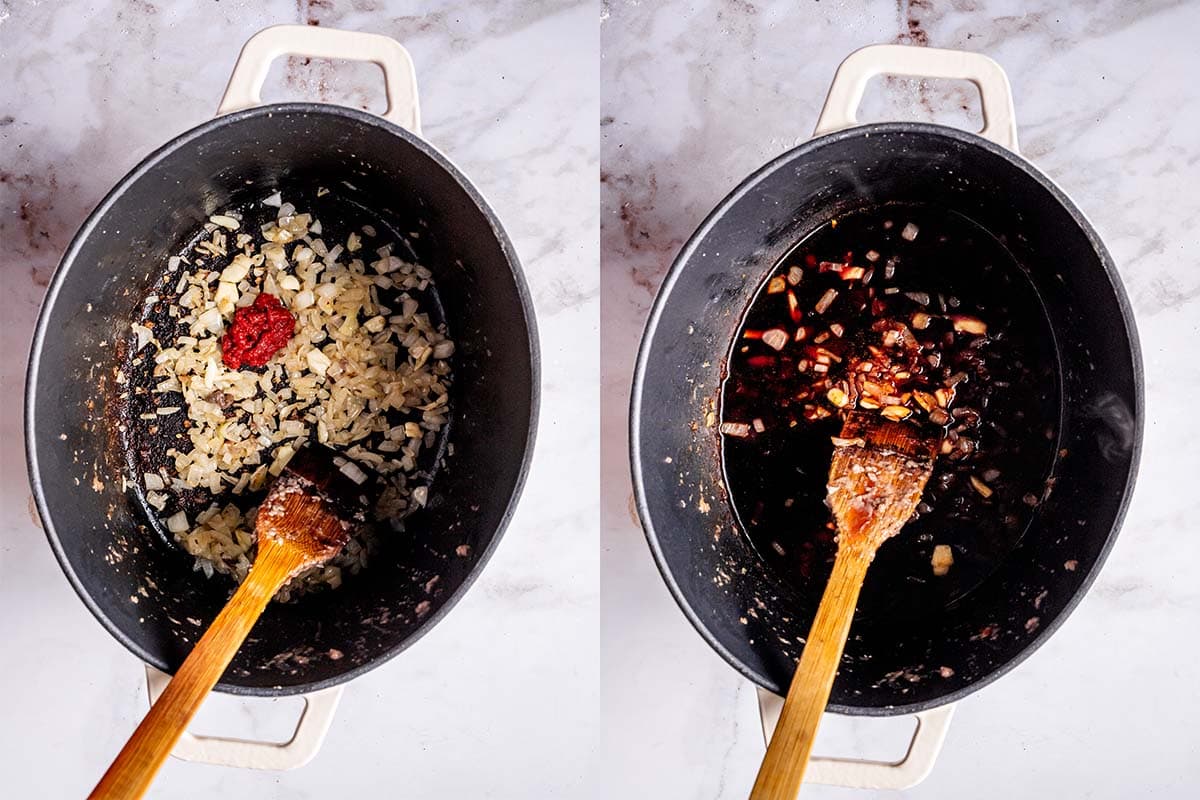
Cook aromatics. Add onion and garlic cloves to the Dutch oven and sauté until the onion becomes translucent. Add tomato paste and stir quickly, then add red wine and cook until the alcohol evaporates.
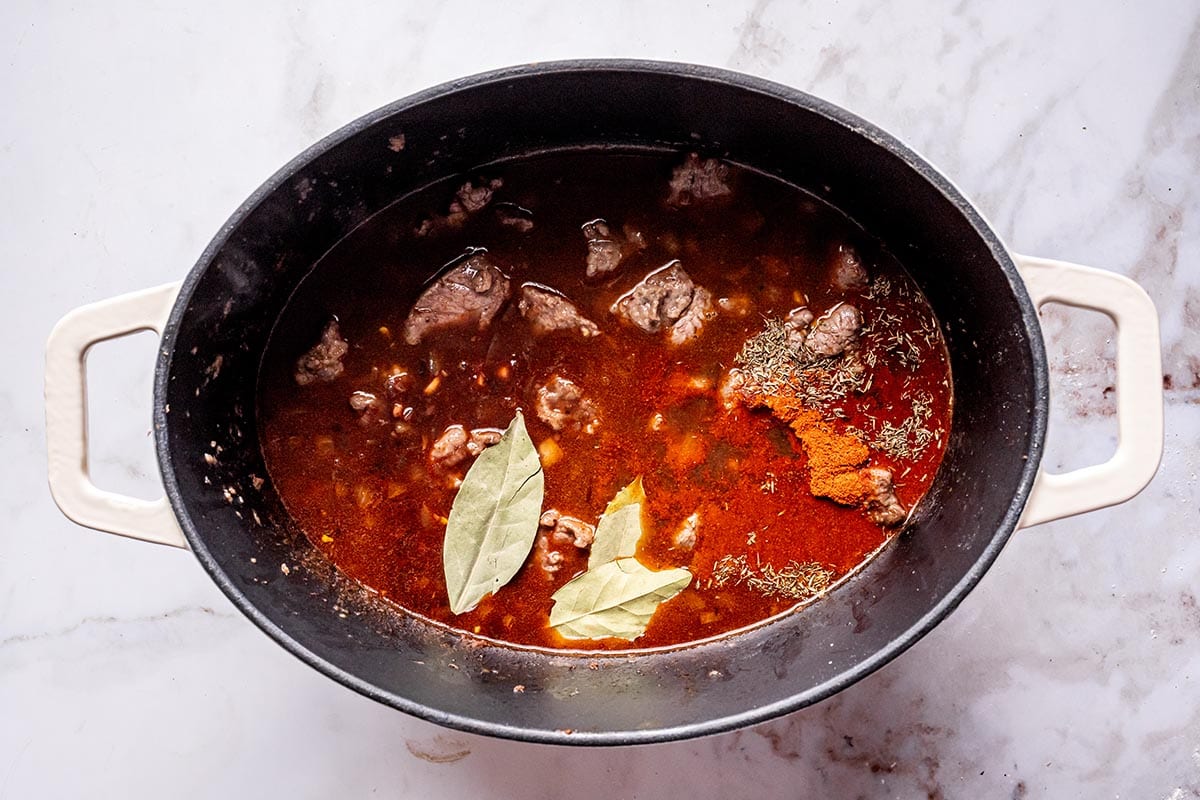
Assemble. Return the meat and its juices to the pot, then stir to combine. Build the broth by adding the balsamic, Worcestershire sauce, beef broth, and water.
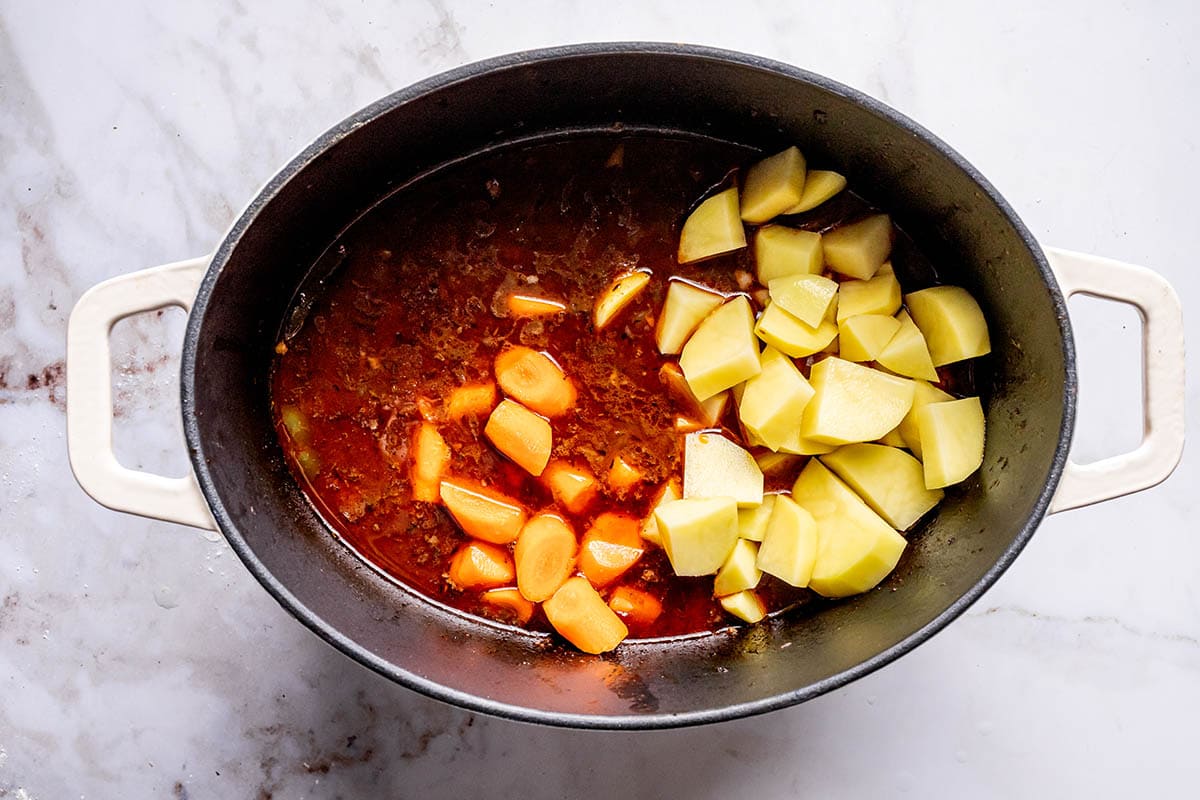
Add veggies. Remove the stew from the oven, add carrots and potatoes, then cook for 45 minutes or until the veggies become tender.
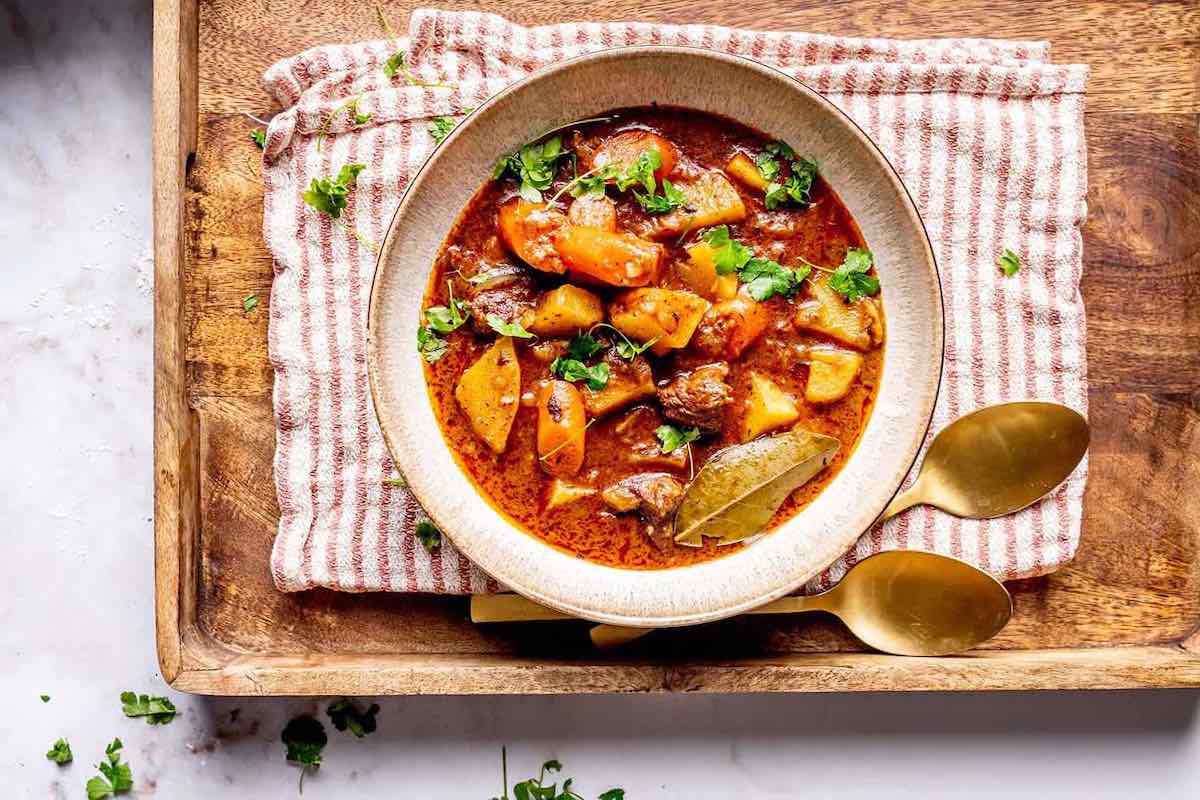
Assemble. Ladle the stew into bowls and serve.
Arman’s recipe tips
- Don’t skip the sear! Trust me, this extra step adds SO much more flavor to the beef and makes the stew richer.
- Preheat the pot before searing. Before browning the meat, make sure the oil is hot and covers the entire surface of the pot.
- Pat the meat dry. This will help the flour adhere to the meat and get even browner.
- Thicken the broth. When I tested this recipe, the broth sometimes came out too thin. When this happens, make a cornstarch slurry using three tablespoons of cold water or broth and 2 tablespoons of cornstarch. Mix until thickened, then whisk it into the broth.
- Cut the vegetables into the same size. So they cook more evenly.
- Taste before serving. I’ve always tasted the dish when finished, then adjusted the seasonings as needed. Sometimes, I’ll even add extra fresh herbs, like thyme or oregano, depending on the flavor profile I’m aiming for.
Frequently asked questions
I like using a Dutch oven for stews because it holds and distributes heat evenly, which is ideal for low-and-slow cooking. I also like how the base also helps caramelize the meat during the searing step, then keeps the temperature steady as everything simmers.
As mentioned earlier, this is the same stew I use when I make it on the stovetop. So, instead of a Dutch oven, you can use an oven-safe pot or skillet.
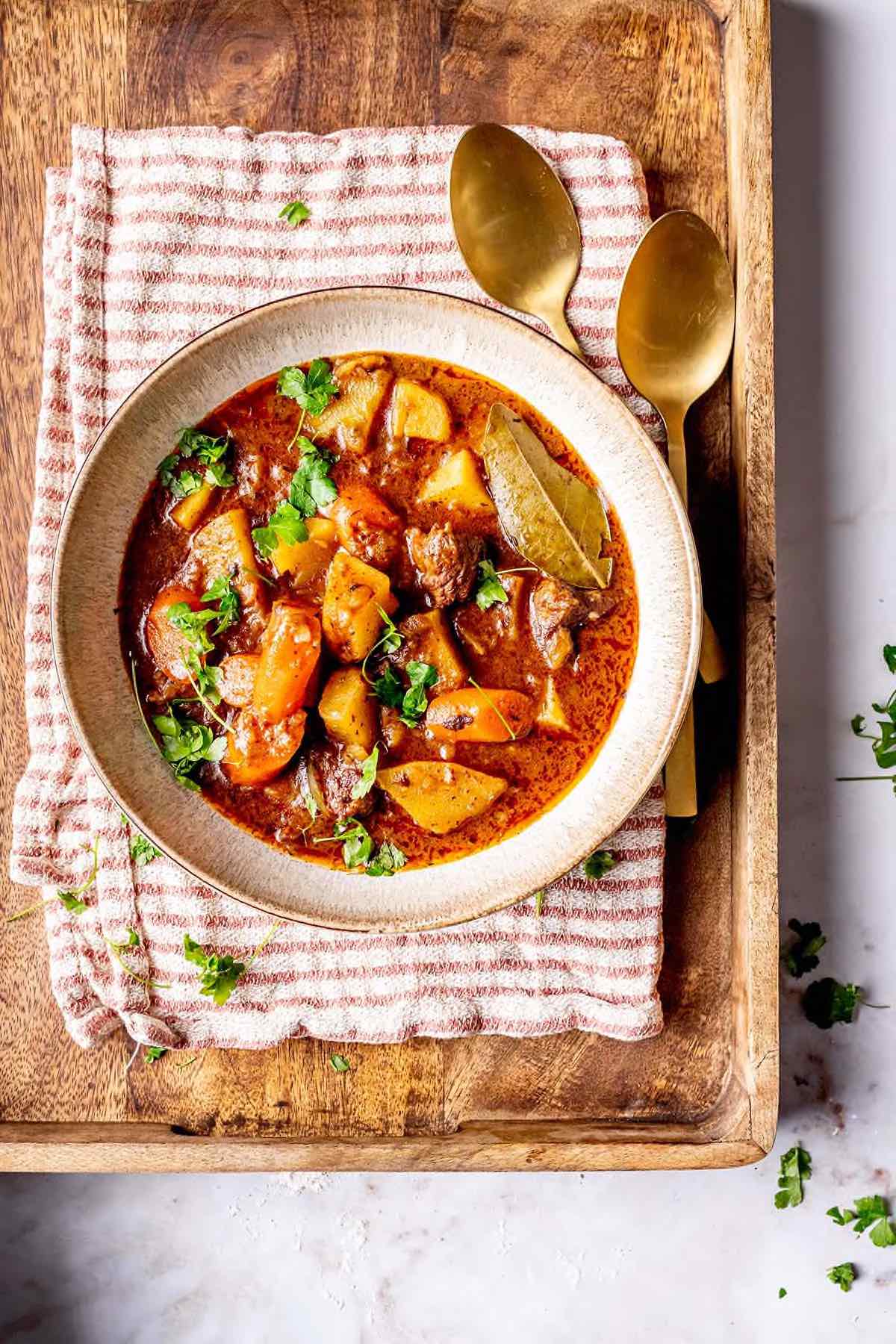
✅ Nutrition reviewed
Nutrition information has been reviewed by registered dietitian Felicia Newell, MScAHN, RD, CPT.
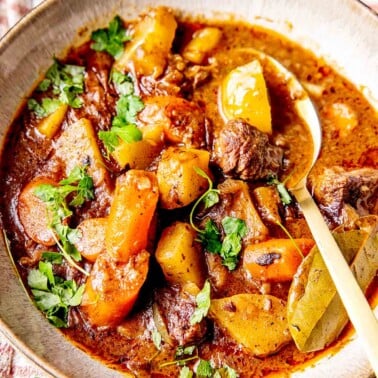
Dutch Oven Beef Stew
Video
Ingredients
- 2 pounds Beef chuck cut into bite-sized pieces
- 2 teaspoons salt
- 1 teaspoon pepper
- 1/4 cup all-purpose flour
- 3 tablespoons butter
- 1 large onion diced
- 4 cloves garlic crushed
- 2 tablespoons tomato paste
- 1 cup red wine
- 1 tablespoon balsamic vinegar
- 2 teaspoons Worcestershire sauce
- 2 cups beef broth
- 1 cup water
- 2 bay leaves dried
- 1 tablespoon paprika
- 3 large carrots
- 2 large potatoes cubed
Instructions
- Preheat the oven to 160C/325F.
- Combine salt, pepper, and flour in a wide bowl. Dredge the meat in the flour mixture and turn on all sides to coat.
- Heat butter in the Dutch oven and sear the meat until browned on all sides. Remove the meat and set aside.
- Add onion and garlic to the Dutch oven and saute until the onion becomes translucent, adding extra oil if needed.
- Add the tomato paste and stir quickly, then add the wine and cook until the alcohol evaporates, around 3 minutes.
- Return the meat to the pot and stir everything together. Pour in the balsamic vinegar, Worcestershire sauce, beef broth, and water, and cook until the liquid starts boiling. Season with bay leaf and paprika, cover with the lid, and place in the oven to cook for 90 minutes.
- Add carrots and potatoes and cook for 45 minutes, or until the veggies become tender.
Notes
- Instant pot method: Season and sear the beef in the instant pot, then add the rest of your ingredients. Secure the lid and pressure cook for 70 minutes. Then, allow the lid to naturally release for 15 minutes.
- Slow cooker method: Season and sear the beef on the stovetop, then add it, along with the remaining ingredients, to your crock pot. Simmer on low for 6-8 hours or high for 3-4 hours.
- TO STORE. Allow the stew to cool completely, then store it in an airtight container in the refrigerator for up to 1 week.
- TO FREEZE. Store the cooled leftovers in a freezer-safe container and freeze for 3 months. I like to freeze them in individual servings to make for quicker reheating. Let the leftovers thaw in the fridge before reheating.
- TO REHEAT. Reheat leftover stew on the stovetop over medium heat or microwave in 20-second intervals, stirring between each, until warm.
Nutrition
More mouthwatering beef dinners
- Salisbury steak
- Dutch oven pot roast
- Beef shanks
- Boneless beef short ribs
- Garlic butter steak bites
- Vegetable beef barley soup
- Round steak
Originally published December 2024














I just made this stew and it was sensational- the beef literally melted in your mouth!
Aw, Anisah- thank you so much for your kind words. The Dutch oven is magic to create melt-in-your-mouth beef, isn’t it 🙂
So this is actually originated from Netherlands? Nice! I never heard any recipe like this.
This is my favorite Dutch oven beef stew recipe!